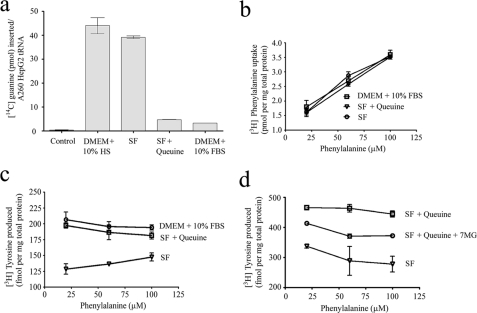FIGURE 2.
Queuine deficiency impairs phenylalanine to tyrosine conversion in HepG2 cells. a, Q-tRNA levels in HepG2 cells grown in DMEM supplemented with 10% horse serum (DMEM + 10% HS), serum-free medium, serum-free medium plus queuine (SF + Queuine), and DMEM supplemented with 10% FBS (DMEM + 10% FBS). tRNA that has been modified by queuosine is unable to accept [14C]guanine into the anticodon loop by the E. coli TGT enzyme reaction. The control reaction contained tRNA from SF grown cells but did not contain TGT enzyme. b, influence of queuine on phenylalanine uptake; c, tyrosine production by HepG2 cells. Cells, grown in the indicated medium, were placed in a phenylalanine- and tyrosine-deficient medium for 1 h. Subsequently, [14C]phenylalanine was added for 30 min. Cells were lysed and radiolabeled amino acids analyzed by separation on a C18 HPLC column followed by scintillation counting. d, effect of 7-methylguanine on tyrosine biosynthesis by HepG2 cells. Cells were cultivated in either SF medium alone (SF), SF medium supplemented with queuine (SF + Queuine), or SF medium pretreated with 7-methylguanine (7MG) for 24 h prior to and after the addition of queuine (SF + Queuine + 7MG). Cells were incubated with increasing concentrations of [14C]phenylalanine for 1 h (rather than the 30 min used earlier) and intracellular phenylalanine and tyrosine levels measured as described above.

